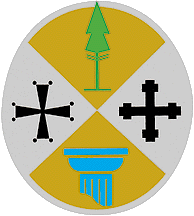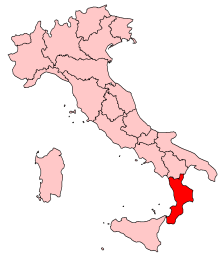Calabria
|
|

| |
| Capital | Catanzaro |
| President | Agazio Loiero (The Union) |
| Provinces | Catanzaro Cosenza Crotone Reggio Calabria Vibo Valentia |
| Municipalities | 409 |
| Area | 15,081 km² |
| - Ranked | 10 th (5.0 %) |
| Population (2001) - Total - Ranked | 2,011,466 10 th (3.5 %) 133/km² |

| |
| Map higlighting the location of Calabria in Italy | |
Calabria, formerly Brutium, is a region in southern Italy which occupies the "toe" of the Italian peninsula south of Naples. It is bounded in the north by the region of Basilicata, to the west by the Tyrrhenian Sea, and to the east by the Ionian Sea. Calabria faces the island of Sicily across the Strait of Messina. The region covers 15,080 km² and has a population of 2.05 million.
The region is divided into five provinces: Cosenza, Crotone, Reggio di Calabria, Vibo Valentia, and Catanzaro. Catanzaro has been the regional capital since 1970, but despite this the regional Parliament is hosted in the former capital of Reggio di Calabria. The switchover to Catanzaro as capital of Calabria was the cause of riots in 1970.
Greeks settled heavily along the coast at an early date and several of their settlements, including Sybaris, Crotona, and Locri, were numbered among the leading cities of Magna Graecia during the 6th and 5th centuries BC. Conquered by the Romans in the 3rd century BC, the region never regained its former prosperity. The inhabitants were in large part driven inland by the spread of malaria and, during the early Middle Ages, by pirate raids.
After several wars with rival Italian tribes, Many Romans, including Cicero, had vacation homes in Vibo Valentia. Calabria was for many years part of the Roman Empire and after its fall, was devastated during the Gothic War before it came under the rule of a local dux for the Byzantine Empire. In the 9th and 10th centuries, Calabria, which had been the rich breadbasket of Rome before Egypt was conquered, was the borderland between Byzantine rule and the Arab emirs in Sicily, subject to raids and skirmishes, depopulated and demoralized, with vibrant Greek monasteries providing fortresses of culture. In the 1060s, Normans under the leadership of Robert Guiscard's brother Roger established a presence in this borderland, organized a government along Byzantine lines that was run by the local Greek magnates of Calabria. In 1098, Pope Urban II bestowed on Roger the equivalence of an apostolic legate and the Hauteville clan formed the precursors of the Kingdom of Naples which in one form or another ruled Calabria until the unification of Italy. This kingdom itself came under many rulers: the Hapsburg dynasties of both Spain and Austria; the French Bourbon dynasty, and briefly Napoleon's general Joachim Murat, who was executed in the small town of Pizzo.
Throughout all this, Calabria remained a very rural and exploited region. The Aspromonte, a mountainous region of central Calabria, was the scene of a famous battle of the Risorgimento (unification of Italy), in which Garibaldi was wounded. Several of the important philosophers of the Risorgimento (namely, Bernardino Telesio from Cosenza, Gioacchino da Fiore from San Giovanni in Fiore, Tommaso Campanella from Stilo) came from Calabria, and famous Americans of Calabrian descent are almost too numerous to name. The seawater around Calabria is very clear, and there is a good level of tourist accommodation. The poet Gabriele d'Annunzio called the seafront at Reggio "The most beautiful kilometer in Italy".
The official national language (since 1861) is Italian. However, as a consequence of its deep and colorful history, other historical languages have been spoken in this region for centuries. The various dialects_of_Calabria are divided into two different language groups. In the northern sections, a dialect of the Neapolitan language called "northern Calabrese" is spoken. In the southern part of the region, a dialect of the Sicilian language called "southern Calabro" is spoken. In isolated pockets, a hybrid language that dates back to the 9th century, called Griko, is spoken. A variety of Franco-Provenēal can also be found in certain communities. In several villages, the Arbėreshė dialect of the Albanian language has been spoken since a wave of refugees settled there in the 15th century.
Important tourist sites
- Tropea, on the Tyrrhenian Sea coast, is a beautiful city, with a nice seaside, renowned for its sweet onions.
- Siderno, on the Ionian Sea coast, has good hotels.
- Gerace, near Locri, is a beautiful medieval city, with a norman castle, an ancient Cathedral, etc
- Stilo, the home of Tommaso Campanella, with a Norman castle and a beautiful Byzantine church, the Cattolica
External tourist sites
- Travel hub for English-speaking travelers to Calabria (http://www.italianvisits.com/calabria)
Universities
- Universitą della Calabria, hosted in Rende.
- Universitą degli Studi Magna Grecia di Catanzaro, hosted in Catanzaro.
- Universitą degli Studi Mediterranea di Reggio Calabria, hosted in Reggio Calabria.
Main Soccer Teams
- Reggina from Reggio di Calabria, now playing in Serie A.
- Catanzaro, which plays in Serie B.
- Crotone, which plays in Serie B.
Template:Italyde:Kalabrien et:Calabria fr:Calabre it:Calabria nl:Calabriė ja:カラブリア州 pl:Kalabria ro:Calabria scn:Calabbria fi:Calabria
